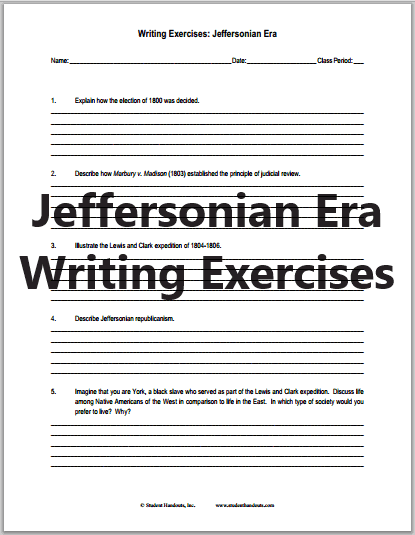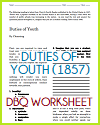Click here to print. Answers will vary.
1. Explain how the election of 1800 was decided.
2. Describe how Marbury v. Madison (1803) established the principle of judicial review.
3. Illustrate the Lewis and Clark expedition of 1804-1806.
4. Describe Jeffersonian republicanism.
5. Imagine that you are York, a black slave who served as part of the Lewis and Clark expedition. Discuss life among Native Americans of the West in comparison to life in the East. In which type of society would you prefer to live? Why?
Marbury v. Madison (1803) is a landmark Supreme Court case that established the principle of judicial review in the United States. Judicial review is the power of the federal courts, particularly the Supreme Court, to review and potentially invalidate laws or government actions that are deemed unconstitutional.
Background: In the final days of his presidency, outgoing President John Adams appointed a number of federal judges and justices of the peace, including William Marbury. Marbury's appointment had been confirmed by the Senate, and his commission was signed and sealed, but it had not been delivered before Adams left office. The new Secretary of State under President Thomas Jefferson, James Madison, refused to deliver Marbury's commission, and Marbury sued Madison for it.
Key Legal Question: The Central legal question in Marbury v. Madison was whether the Supreme Court had the authority to order Madison to deliver Marbury's commission (a writ of mandamus).
The Court's Decision:
- Chief Justice John Marshall, who was also serving as Secretary of State at the time of the appointment, delivered the Court's unanimous decision.
- In the decision, the Court ruled that Marbury was indeed entitled to his commission, as the appointment was valid and properly made.
- However, the Court also held that it lacked the authority to issue a writ of mandamus in this case because the Judiciary Act of 1789, which had granted the Court this power, was unconstitutional. In other words, the Court concluded that Congress had exceeded its constitutional authority by giving the Court the power to issue such writs.
Key Principles Established:
- Judicial Review: Marbury v. Madison is most famous for establishing the principle of judicial review. The Court asserted its authority to review the constitutionality of acts of Congress and executive actions. In doing so, it declared that it had the power to invalidate laws or government actions that it deemed unconstitutional.
- Supremacy of the Constitution: The case emphasized the supremacy of the Constitution as the highest law of the land. It made clear that no act of Congress could violate the Constitution, and it was the role of the judiciary to ensure that this principle was upheld.
- Separation of Powers: The decision reinforced the concept of the separation of powers among the branches of government. The Court's refusal to enforce a provision of the Judiciary Act of 1789 underscored that each branch of government had to operate within the boundaries of the Constitution, and the judiciary had the authority to check the actions of the other branches.
Marbury v. Madison's establishment of the principle of judicial review fundamentally shaped the role of the federal judiciary in the United States. It empowered the courts to serve as guardians of the Constitution and to play a vital role in interpreting and safeguarding the nation's fundamental law. This landmark case continues to be a cornerstone of American constitutional jurisprudence. |



















































